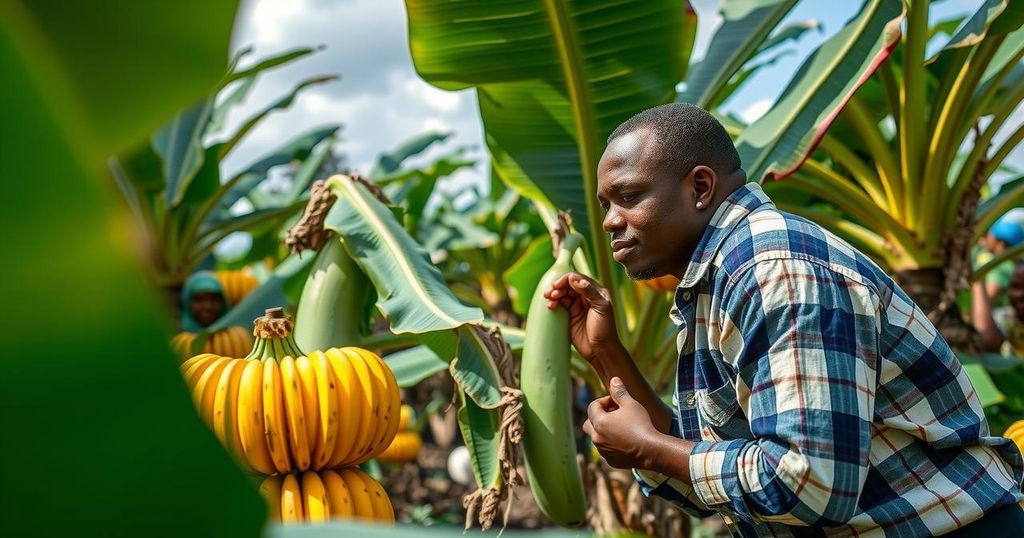Innovative Insurance Solutions Empower Uganda’s Banana Farmers Against Climate Change Catastrophes
Ahumwire Justine, a banana farmer in Uganda, recently experienced devastating losses from a storm, highlighting the vulnerability of unprotected crops to climate change. The NDC Action Project, a joint initiative of the United Nations Environment Programme, seeks to provide support through innovative insurance solutions and training on digital literacy, ultimately aiming to protect farmers from the increasing frequency of extreme weather events. This initiative is proving essential in enhancing the resilience and financial security of Uganda’s agricultural community, particularly for smallholder farmers.
In Uganda’s southwest, banana farmer Ahumwire Justine faced a devastating storm last October that destroyed a significant portion of her crop and claimed the lives of her livestock. This unfortunate incident underscored the vulnerability of her unprotected two-hectare plantation against the growing threat of extreme weather events driven by climate change, ultimately leading her to contemplate abandoning her land due to the loss of income and food security. According to the Intergovernmental Panel on Climate Change, the increasing frequency and severity of these storms pose dire challenges for farmers like Justine. In response, initiatives such as the NDC Action Project, a collaboration of the United Nations Environment Programme (UNEP) and the UNEP Copenhagen Climate Centre, aim to bolster the resilience of smallholder farmers through innovative insurance solutions. Mirey Atallah, Chief of the Adaptation and Resilience Branch within UNEP’s Climate Change Division, highlighted the necessity of combining technical and financial instruments to help farmers adapt to the climate crisis. Specifically, bananas play a crucial role in Uganda’s economy, involving nearly half the farming population, as they serve not only as a staple food source but also have commercial uses beyond mere consumption. Nonetheless, the farmers’ plight has worsened due to erratic weather patterns, characterized by prolonged rainy seasons followed by severe drought. Florence Muranga, Director of the Banana Industrial Research and Development Centre, emphasized the devastating impact extreme weather can have on agricultural livelihoods, stating that farmers could lose everything ‘in one day’. The centre has been instrumental in facilitating the expansion of access to crop insurance by training farmers in digital literacy. A pilot group of 930 banana farmers learned to use smartphones to document their crops’ conditions digitally, enabling rapid assessment and compensation following a storm through a streamlined claims process, significantly aided by Agro Consortium Limited, a cooperative of insurance companies. Notably, a considerable proportion of the initial participants in this training program were women, exemplifying a step towards inclusivity and empowerment within the agricultural community. Incorporated measures also include training in water management and agroforestry practices. Such initiatives have reportedly enhanced productivity and reduced climate-related losses, thereby lowering the insurance companies’ payout risks. Moving forward, the proof-of-concept is set to scale to include all 5,000 farmers represented by the Banana Industrial Research and Development Centre and aims for eventual expansion to an additional 50,000 farmers nationwide. For Justine, the newfound insurance provides invaluable security and assurance against future calamities, marking a significant shift from prior reliance on self-sufficiency in the face of uncontrollable environmental factors. The UNEP’s commitment to addressing climate crises through coordinated sectoral approaches is critical, aspiring to maintain global temperature increases within safe limits, relevant to the commitments made in the Paris Agreement. In summary, agricultural insurance schemes like those being deployed in Uganda not only provide financial safety nets for famers at greater risk due to climate change but also represent vital steps towards long-term resilience and sustainability within the agricultural sector.
The context of this article revolves around the impact of climate change on agriculture, particularly how extreme weather phenomena are jeopardizing the livelihoods of banana farmers in Uganda. Ample evidence suggests a correlation between climate change and the increasing unpredictability of weather patterns affecting farming activities. These challenges necessitate innovative solutions to provide financial stability and security for farmers facing mounting risks. The NDC Action Project exemplifies a collaborative effort to enhance the resilience of smallholder farmers, demonstrating significant advancements in agricultural insurance as a practical tool to mitigate the effects of climate-induced losses.
The introduction of a novel insurance model through the NDC Action Project stands as a crucial advancement for banana farmers in Uganda, enabling them to better withstand the financial impacts of extreme weather events caused by climate change. Initiatives emphasizing digital literacy and inclusive training have proven effective, ensuring that farmers can readily access resources that enhance their adaptability to climate variability. Moving forward, the goal of expanding these protective measures to a larger number of farmers across Uganda offers hope for sustainable agricultural practices and improved economic stability in the face of ongoing environmental challenges.
Original Source: www.unenvironment.org




Post Comment